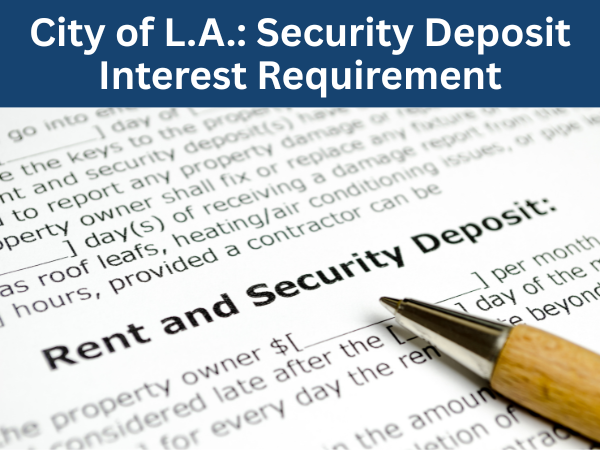City of L.A.: Security Deposit Interest Requirement

Contributed by the Apartment Association of Greater Los Angeles
Landlords of properties located within the City of Los Angeles that are subject to the Los Angeles Rent Stabilization Ordinance (LARSO), also known as Rent Control, are required to pay tenants interest on their security deposits, pursuant to specific regulations. Recently, tenant attorneys have increasingly and successfully used landlords’ non-compliance with these security deposit interest requirements as a defense in eviction proceedings. This is now a common tactic and no longer a rare occurrence. To protect your interests and avoid jeopardizing eviction actions, I strongly recommend that you review and update your security deposit interest procedures to ensure full compliance with the applicable law.
The relevant regulation is the Los Angeles Municipal Code (LAMC) Section 151.06.02.
There are two key compliance issues:
- Determining the Correct Interest Rate: The required interest rate is set annually by the City and is readily available online at the Apartment Association of Greater Los Angeles’ website at www.aagla.org located under the “News and Information” tab.
- Proper Method and Timing of Payment: This is where many landlords inadvertently fail to comply. The most common mistake is waiting until the end of the tenancy to calculate and pay the accumulated interest along with the security deposit refund. This approach does not satisfy the requirements of LAMC Section 151.06.02.
What Does the Law Require?
- Security deposit interest must be paid to the tenant either monthly or annually.
- Payment can be made as a direct payment to the tenant or as credited against the tenant’s rent.
- Landlords must notify tenants in writing of their chosen method of payment.
Los Angeles Municipal Code,
Here is a direct citation from the Los Angeles Municipal Code, LAMC Section 151.06.02:
“Interest shall begin accruing on November 1, 1990, on a monthly basis. A tenant shall be given the unpaid accrued interest in the form of either a direct payment or a credit against the tenant’s rent. The landlord shall choose between these two methods of payment and notify the tenant in writing of his or her choice. The landlord may elect to pay the accrued interest on a monthly or yearly basis.”
Recommendations
- Ensure your security deposit interest payments are made either monthly or annually, as required.
- Decide whether to pay interest directly or as a rent credit and provide written notice to your tenants of your chosen method.
- For new tenancies, include this notice in your lease agreements. For existing tenants, issue a written notice or letter informing them of your chosen method.
- If you are in arrears on paying security deposit interest, be sure to get caught up as soon as possible.
Failure to comply with these requirements can result in the loss of eviction cases and other legal complications.
Please review your current practices and make any necessary adjustments to ensure compliance.
| City of L.A. Interest Rates on Security Deposits | |||
| For Time Period | Interest Rate | ||
| November 1, 1990 to December 31, 2000 | 5.000% | ||
| Calendar Year 2001 | 2.000% | ||
| Calendar Year 2002 | 0.00%* | ||
| Calendar Year 2003 | 1.000% | ||
| Calendar Year 2004 | 0.260% | ||
| Calendar Year 2005 | 1.210% | ||
| Calendar Year 2006 | 1.740% | ||
| Calendar Year 2007 | 2.390% | ||
| Calendar Year 2008 | 3.220% | ||
| Calendar Year 2009 | 1.760% | ||
| Calendar Year 2010 | 0.550% | ||
| Calendar Year 2011 | 0.290% | ||
| Calendar Year 2012 | 0.220% | ||
| Calendar Year 2013 | 0.150% | ||
| Calendar Year 2014 | 0.180% | ||
| Calendar Year 2015 | 0.120% | ||
| Calendar Year 2016 | 0.060% | ||
| Calendar Year 2017 | 0.070% | ||
| Calendar Year 2018 | 0.070% | ||
| Calendar Year 2019 | 0.060% | ||
| Calendar Year 2020 | 0.230% | ||
| Calendar Year 2021 | 0.060% | ||
| Calendar Year 2022 | 0.030% | ||
| Calendar Year 2023 | 0.040% | ||
| Calendar Year 2024 | 0.520% | ||
| Calendar Year 2025 | 4.320% | ||
| Updated 5/21/25 | |||
This article is for general information purposes only. Laws may have changed since this article was published. Before acting, be sure to receive legal advice from a licensed professional.
